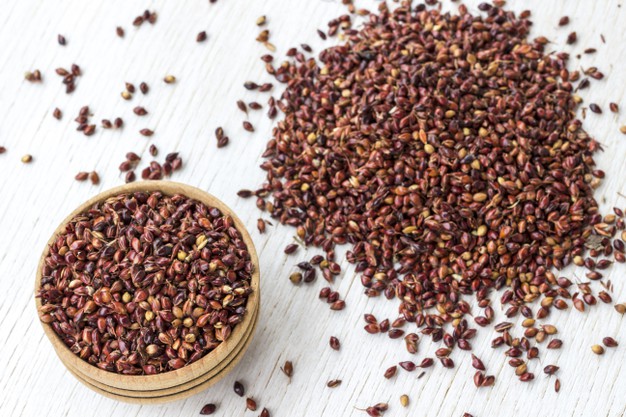Apple is a delicious and nutritious fruits belongs to Rosaceae family. It helps to protect the body from various diseases and offers numerous health benefits.
Nutritional profile
- It contains desirable amount of carbohydrates and significantly rich in fibre. It contains both soluble and insoluble fibres
- It contains negligible amount of proteins and does not contain enough fat
- It is loaded with various micronutrients like Vitamin A, Vitamin C, Vitamin K, potassium, magnesium and calcium
- It also contains several biologically active components that exert various nutraceutical activities
Biological activity
Antioxidant activity
- It is loaded with antioxidants and play vital role in preventing oxidative damages
- Its micronutrients and polyphenolic components act as antioxidant and help in neutralizing free radicals and protect the body from their detrimental effects
- It helps to prevent cellular damages by protecting them from free radical induced oxidative damages thus helps in sustaining their activity, which ultimately promotes overall wellbeing
- It helps in preventing lipid peroxidation as well, which is considered as one of the leading causes of degenerative diseases
Anti-inflammatory activity
- It exerts potent anti-inflammatory activity thus help in decreasing the risk of developing chronic inflammatory diseases
- Its polyphenolic components are accountable for decreasing the level of inflammatory mediators in body, which ultimately helps in preventing inflammation
- It helps to prevent joint swelling as well thus individual suffer from arthritis should consume apple at least once a day in order to improve their symptoms


Anti-carcinogenic activity
- Apple is considered as one of the most important fruits that has cancer fighting ability
- It contains relatively higher amount of antioxidants than other fruits and its oxidative stress reducing capacity is thought to be one of the most important features responsible for lowering the prevalence of cancers
- Fibre is another important constituent of apple help in reducing the risk of developing cancers
- Polyphenols present in apple are also accountable for exhibiting anti-carcinogenic activities and help to hinder the growth of malignant cells within body by inducing apoptosis
- It has seen that individual who consume apple are less prone to develop lung cancer, colorectal cancer, esophageal cancer, oral cavity cancer and breast cancer
Hypolipidemic activity
- It exerts potent hypolipidemic activity, which ultimately helps in decreasing total body fat percentage
- Its fibre content especially pectin fibre content helps in decreasing the concentration of LDL or bad cholesterol in body and also inhibits its oxidation, which ultimately lowers the susceptibility of hypercholesterolemia and cardiac disorders
- It helps in decreasing the concentration of VLDL and triglyceride in body too, which further reduces the prevalence of arterial hardening, cardio vascular diseases and visceral obesity

Hypoglycemic activity
- Fructose and polyphenol components of apple play vital role in stabilizing blood sugar level as they help in improving the metabolic balance
- Anthocyanin is another important antioxidant present in apple helps in maintaining normal blood glucose level
- Its fibre content is responsible for slowing down the rate of glucose absorption in body, which is also considered as an important feature responsible for decreasing blood sugar load
- It is very effective for reducing the prevalence of type 2 diabetes mellitus
Hypotensive activity
- Its hypotensive activity makes it an imperative remedial action for hypertension
- Potassium present in apple plays vital role in preventing hyperetension as it acts as a vaso-dilator that helps in dilating the blood vessels as a result decreases high blood pressure
- Its polyphenolic components (especially epicatechin) are also accountable for exerting hypotensive activity
Health benefits
Role on immunity
- Apple is considered as one of the most important immune boosting fruits as it contains numerous immune supporting nutrients
- Its Vitamin C content plays vital role in stimulating the production of WBC, which helps to make the body able to fight against infections
- Quercetin is another important component present in apple acts as antioxidant. It helps in improving and reinforcing the immune system especially during stress condition.
- Moreover consumption of apple is really very helpful for reducing the susceptibility of becoming ill


Role on digestive health
- Consumption of apple is very helpful for promoting the overall health of digestive system
- Its fibre content helps in preventing constipation as it is related with increasing stool mass and softness, which ultimately helps to facilitate defecation
- It also helps to improve colonic health and plays vital role in reducing the risk of developing diverticular diseases
- Its consumption is very much helpful for improving the symptoms of irritable bowel syndrome
- Consumption of apple is also linked with relieving hemorrhoids and all the credit goes to its fibre content
- It also helps in improving gut health as its fibre acts as probiotic and help in promoting the growth of intestinal beneficial microbes
- It plays vital role in repairing the lining of stomach, which get affected or injured by consuming non-steroidal anti-inflammatory drugs
Role on nervous system
- Apple is closely related with enhancing brain power
- It helps in stimulating the production of acetylcholine, which ultimately promotes the transmission of nerve impulses
- It is also associated with preventing the damages of nerve cells thus improves their activity
- It plays imperative role in delaying the progression of neuro-inflammatory events and thus significantly reduces the prevalence of neurological disorders especially Alzheimer’s diseases and Parkinson’s disease
- It also helps to improve cognition as well as memory

Role on cardiovascular health
- Consumption of apple is directly linked with decreasing the susceptibility of cardio vascular diseases
- Soluble fibre present in apple plays vital role in decreasing cholesterol concentration, which is considered as one of the leading causes of cardiac problem
- Excessive level of cholesterol is responsible for increasing the risk of plaque formation (fat deposition within blood vessels) that results in arterial hardening and hinders blood supply, which ultimately increases the susceptibility of arthrosclerosis
- Its polyphenolic components are accountable for protecting the heart from oxidative and inflammatory damages, which also help in lowering the risk of developing cardio vascular diseases
- Consumption of apple is extremely effective for reducing the prevalence of strokes and heart attacks
Role on skeletal system
- Consumption of apple is very effective for strengthening the overall skeletal system
- It helps to stimulate bone mineralization process as a result helps in increasing bone mass and bone mineral density
- Its phlorizin content (flavonoid) plays vital role in preventing bone loss related with menopause
- It is also associated with reducing the prevalence of bone degeneration by protecting bones from oxidative and inflammatory damages

Therapeutic uses
It has been traditionally used for various therapeutic purposes, which include –
- It is used as an important therapeutic substance for oral health. Its fibre and water contents act as an imperative cleanser. Malic acid present in apple also helps in enhancing salivation that ultimately helps to remove bacteria from mouth. Its micronutrient components play vital role in promoting the health of teeth and gum. One can include apple in diet for obtaining a brighter smile
- It helps to promote hepatic health, which ultimately ensures healthy metabolism
- Its consumption helps in reducing the prevalence of gall stones as well
- It also helps to reduce the susceptibility of developing cataract
- Its fibre content makes it a supper food for weight reduction
- It helps to improve the symptoms of asthma too
Moreover one should include apple in diet for keeping doctors away

Source:
Hyson, D.A., 2011. A comprehensive review of apples and apple components and their relationship to human health. Advances in nutrition, 2(5), pp.408-420.
Hyun, T.K. and Jang, K.I., 2016. Apple as a source of dietary phytonutrients: an update on the potential health benefits of apple. EXCLI journal, 15, p.565.
Raskin, I. and Ripoll, C., 2004. Can an apple a day keep the doctor away?. Current pharmaceutical design, 10(27), pp.3419-3429.
Shehzadi, K., Rubab, Q., Asad, L., Ishfaq, M., Shafique, B., Modassar, M., Ranjha, A.N., Mahmood, S., Mueen-Ud-Din, G. and Javaid, T., 2020. A critical review on presence of polyphenols in commercial varieties of apple peel, their extraction and Health benefits. Open Access J. Biog. Sci. Res, 6, p.18.
Skinner, R.C., Gigliotti, J.C., Ku, K.M. and Tou, J.C., 2018. A comprehensive analysis of the composition, health benefits, and safety of apple pomace. Nutrition reviews, 76(12), pp.893-909.









